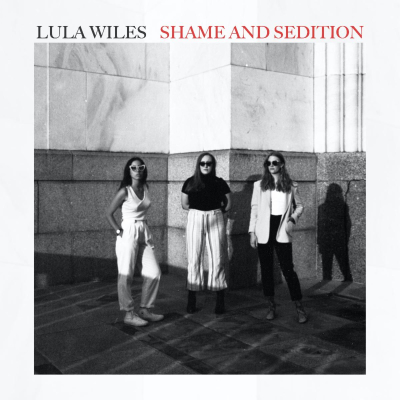|
On their new release, 'Shame and Sedition,' Lula Wiles addresses our current political and social landscape, naming the tendrils of racial capitalism, misogyny, and colonialism that permeate the media and our lives. Available May 21st from Smithsonian Folkways Recordings, the band's remarkable and poignant third album showcases songs that capture America’s reckoning around its own narrative, in conjunction with the trio’s new, evolved sound.
Pre-order the album HERE
Written entirely in lockdown, Isa Burke, Ellie Buckland, and Mali Obomsawin’s latest work was recorded over three weeks in early summer 2020 in a farmhouse in the Wabanakiak homeland. As the country grapples with the coronavirus pandemic, social isolation, death, soaring levels of poverty, and racial injustice, Lula Wiles felt an urgency to produce a record that reflects the raw tension of this moment and demands meaningful action.
The trio have also dialed in their sound to an even greater extent; in earlier iterations of the band, Lula Wiles earned praise from NPR, PAPER, and The Boston Globe for their three-part harmonies, which leaned heavily into folk and Americana. Today, Burke, Buckland, and Obomsawin, who originally connected at college, have embraced a brasher indie-rock aesthetic, with layers of piano, acoustic strums, expansive electric guitar, warm bass notes, and mid-tempo percussion. Even with this latest sonic dimension, each song is built around Lula Wiles’ pitch-perfect harmonies and incisive lyrics.
On ‘Shame and Sedition’s opening track, “In Dreams,” Obomsawin channels and responds to the words of the great James Baldwin. A citizen of the Abenaki Nation, she notes that “In Dreams” is a dedication to “all people fighting colonial oppression around the world.”
“We have been looted of our lands,” she says. “We have been looted of our lives and bodies. We have been looted of our labor. But we will never be looted of our fire — our right to reclaim what is ours, and our power to ignite revolution and liberation.”
Another track, “Everybody (Connected),” echoes the delicacy of The Beatles’ “Across the Universe” in melody and spirit, with the observant lyrics, “Everybody wants to be connected to something bigger, all in all they want their paradise to grow to such a figure.”
Meanwhile, the harmony-driven “Do You Really Want the World to End,” which is co-written with drummer Sean Trischka, looks at allyship and inaction. The song describes the feeling of having to implore others to care about “people like me and my friends,” a group designation left up to the listener’s interpretation, and asks the listener: how can we help repair the damage being done to local communities, the world at large, and future generations?
Drawing sharp connections between colonization and capitalism — how the two revolve around each other and affect the haves and the have nots — ‘Shame and Sedition’ takes one of the wealthiest men in the world to task on “Oh My God.” Addressing Amazon kingpin Jeff Bezos, Lula Wiles sing pointedly, “I’ll admit that you’ve done pretty well so far / Did you think that you would end up where you are? / Do you think that you’re a god now, in your fancy cars? / Stepping over bodies, grinning like a movie star” before throwing out a warning: “Hunger is an engine, and anger is fuel.”
"The role of the artist is to make the revolution irresistible,” reads an opening quote from poet and social activist Toni Cade Bambara in the liner notes to ‘Shame and Sedition.’ The band identifies “shame” here as a number of things — an obstacle, a catalyst, a manipulative force, a power dynamic. It is what Burke, Buckland, and Obomsawin identify as a mechanism in the United States, a place that operates less as a country as it does a giant corporation grooming obedient servants. The pandemic has revealed the rot at our core, and Lula Wiles seek to address the myriad problems we face. Like so many artists before them — Billie Holiday, Sam Cooke, Marvin Gaye, Bob Dylan, CSNY, Aretha Franklin, Nina Simone, and too many more to name — Lula Wiles are unafraid to use their privilege and platform to shed light on some of the most pressing issues of our time.
“The interconnected legacy of colonialism and capitalism is long and ugly, and it reaches from illegitimate international borders all the way down to interpersonal relationships,” reads ‘Shame and Sedition’s liner notes. “We live in a world that often makes it difficult for us to be good to each other, and to ourselves. Perhaps in retrospect, we can read that story in all of the songs on this album. We hope that ‘Shame and Sedition’ will invite listeners into the uncomfortable, confrontational spaces where transformation happens.”
|

